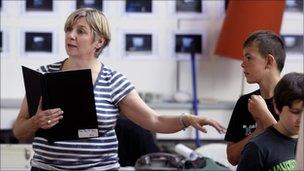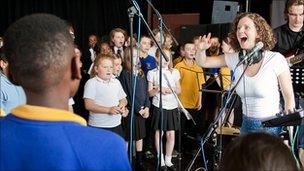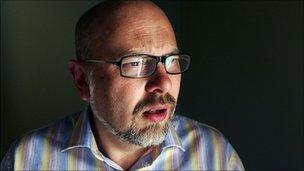Victoria Wood stages choir's story
- Published

Victoria Wood has written and directs That Day We Sang, which she describes as "a play with music". Photo: Catherine Ashmore
Victoria Wood is telling the story of a 1920s children's choir in a stage show that will premiere at this year's Manchester International Festival.
In 1925, some 250 working class children from more than 50 schools across Manchester were recruited for a choir that would go down in musical history.
They rehearsed twice a week, and by 1929 were deemed good enough to make a recording with the prestigious Halle Orchestra by its principal conductor Sir Hamilton Harty.
Together, they recorded Henry Purcell's Nymphs and Shepherds at the Free Trade Hall. The angelic performance made the resulting 78rpm record a surprise hit.
Forty-five years later, Thames Television reunited some of the choristers for a documentary about that day.
A 21-year-old Victoria Wood happened to be watching. And the tale of those children, and what became of them, has stayed with the comedian ever since.
"I've always thought it would make a good story, of the children making that record," Wood says.
"It's a famous record and it was very unusual for schoolchildren to be making a record in 1929, especially with the Halle Orchestra."
'Wonderful quality'
The crackly recording has an ethereal quality that has helped it speak across the decades, Wood explains.
"There's just something about the sound of it - I don't know whether it's because it was recorded on one microphone, and so it doesn't sound like a modern record, or whether it's because they sing really fast.
"I don't know what it is. There's some wonderful quality about it that I find very touching."
When the Manchester International Festival asked Wood, from Bury, for ideas for any Manchester-related shows, she immediately thought about recreating that recording.

Some 100 local schoolchildren have formed a new choir to sing Nymphs and Shepherds on stage. Photo: Haydn Rydings
"My starting point was to reconstruct that event," she says. "But then I thought actually just to reconstruct that event, that's not a play, that's just a kids' concert.
"And so I started to weave in this story of what those kids might be like 40 years down the line."
The result is That Day We Sang, which she describes as "a play with music".
"This isn't a musical," she insists. "This is a play with songs - slightly different."
So the play flits between 1929, using a choir of 100 current schoolchildren, and 1969, when the middle-aged former choristers are reunited.
It centres on Tubby, now an overweight insurance man, and Enid, a secretary, who reflect on where the decades have gone.
"They're reunited for a news interview on local telly," Wood explains. "This is something that Tubby hasn't heard for many, many years.
"Just hearing that music and thinking about that day and thinking about who is was then and who he is now - it emboldens him to make a change in his life and make a move towards having a relationship with somebody."
Wood is now 58 and is entitled to reflect on three decades of distinction on stage and screen, and can be comfortable in her position as a cosy national presence whose comic and dramatic touches rarely disappoint.
But as the story is about people looking back on missed opportunities and seeking to change their lives, does it reflect anything she has been thinking about herself?

The Thick Of It and Twenty Twelve's Vincent Franklin will play the character of Tubby
She responds vaguely about things that she writes being "always something to do with what you're thinking about, but you don't even know what you're thinking about until you write".
"What you think you're thinking about is a choir and two middle-aged people. You actually may be thinking about lots of other things that probably are to do with your own life or you own emotions," she adds.
And then she avoids going further by saying that she does not want to draw comparisons with her own life because the audience must be able to interpret the story in their own way.
Wood has written and directs the show, but will not appear herself.
Vincent Franklin, who has appeared in TV comedies The Thick Of It and Twenty Twelve, will play Tubby, with Olivier Award-winning actress Jenna Russell as Enid.
The new children's choir comprises pupils from three primary schools and one secondary in north Manchester.
Schools' benefits
As well as giving them experience on stage, the choir will also benefit the children with the transition between schools, Wood explains.
"They think it will help those children who are in primary school. It will give them a better bridge and a better understanding of what it's like to be in secondary school."
That Day We Sang is one of the most high-profile events at the festival, which kicks off on Thursday and also includes new work by Bjork, Damon Albarn and theatre company Punchdrunk.
And it is a return to Manchester for Wood, whose tour of Acorn Antiques: The Musical! opened in Salford in 2006.
"I haven't done a big theatre piece for a few years, it's mainly been TV stuff," she says.
The festival, she explains, is "just a chance to do something you couldn't do in any other situation".
"It is a story about Manchester for Manchester," she adds.
That Day We Sang runs at the Manchester Opera House from 6-17 July.
- Published17 March 2011
- Published30 December 2010